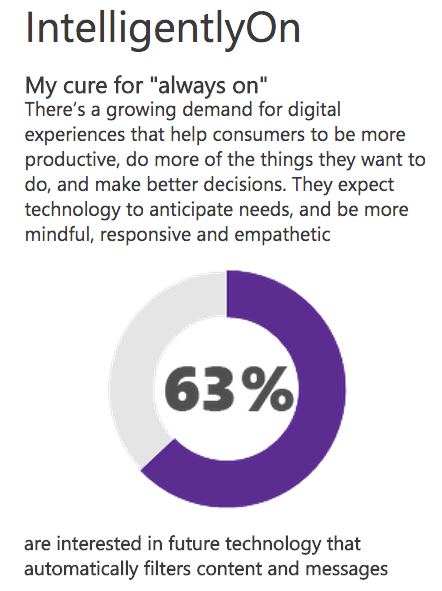The Future Is Intelligent Advertising
What does the future hold for search engine marketers? Columnist John Cosley of Microsoft discusses how personalization and context will change the way we do paid search.

In its earliest form, the Internet represented a land of boundless opportunity. Fire up MSN, ask “the Internet” a question, and back comes the answer. Interested in garden gnomes, Japanese cuisine, or classical guitar? No problem; just open up your web browser, and there’s a selection of websites for you to browse for hours on end.
Recently though, the ever-expanding, limitless nature of the Internet has ceased to excite us and started to intimidate us. In part, this is due to the nature of our relationship with it. Although we still go out to “discover,” we also spend large percentages of our time online “receiving” information, notifications and alerts that (on the face of it, at least) should keep us better informed and more productive.
Overwhelming Instead Of Empowering
The problem is that the 21st-century consumer now uses so many digital services — and is connected to so many different devices — that technology is overwhelming them rather than empowering them. It’s a distraction, not a shortcut. Little wonder that according to recently-announced data from Microsoft Advertising, 63% of consumers are “interested in future technology that automatically filters content or messages so they only see or hear what they need to at any one time.”
This trend is part of a wider sense of frustration amongst consumers that, despite the amount of personal information they regularly supply online, technology isn’t keeping its end of the bargain. If we take the time to educate a brand about ourselves — our behavior, habits, tastes, and turn-offs — we expect them to filter their messages to us accordingly. Microsoft’s study revealed that over a third [39%] are open to sharing their data with brands, but only in exchange for better experiences.
The message for brands is clear: Less is more. A consumer doesn’t just want, but expects you to use the data they have provided to replace the barrage of aimless marketing messages with fewer, more targeted, and more relevant experiences.
Context is important, too. Consumers need brands to understand when and where they want to engage, then select the right place at the right time. If you do, they’ll provide you with more information for you to refine again and again.
Personalization Is Key
Need more evidence that personalization is the way to go? A recent paper by Econsultancy and RedEye revealed that 92% of global company marketers reported an uplift in search engine marketing (SEM) conversion rates after implementing personalization, with 32% characterizing this lift as “major.”
Understanding to whom you are serving an ad, the context of that ad (across devices, time of day, location, etc.), and the experience you provide once they click on that ad will ultimately set the tone with the customer. The more specific the message, and the more relevant the resulting experience, the more open the customer will be to take action. Advertisers who understand this — and act upon it — are in the best position to maximize customer opportunities.
Search ad platforms, such as Bing Ads and AdWords, have taken notice as well, making large investments in infrastructure and ad products that give advertisers more flexibility in providing better consumer experiences.
The Beginning Of Search Audience Marketing
Tagging and measurement tools, such as Universal Event Tagging (UET) on Bing Ads, create the foundation for remarketing. This allows for audience-based buying scenarios and provides advertisers with the ability to better customize the ad experience to the customer. With UET, this can extend across search and display ads, for example.
And this is just the beginning. Looking into the future, as Bing Ads and AdWords continue to innovate through data and data sharing across first- and third-party resources, you can expect to have more tools to enable delightful customer experiences and deeper customer insights.
While a deep understanding of your customer is essential to kick-starting this virtuous circle, consumers do expect brands to be completely transparent about data collection. In fact, according to internal Microsoft data, 83% of consumers expect brands and advertisers to ask for permission before digital information is used.
Filtering Is Essential
Another key learning is that consumers will reward the brands that help them to control the constant flow of information thrown at them day-in, day-out. Companies that offer ways to filter out the irrelevant and surface the golden nuggets will win out. Microsoft’s intelligent personal assistant, Cortana, is an example of a solution that is capable of slicing through the clutter and guiding consumers in their decision making.
Looking ahead, the emergence of machine learning and anticipatory technology will also play a part in vetting the information flowing to consumers via digital channels.
The future is “intelligent advertising” — advertising that understands individual consumers and can deliver tailored content at the right place, at the right time, and on the right platform. Brands capable of bringing the right content from the Internet to the fingertips (or even wrists) of consumers while intelligently avoiding “information overload” will be handsomely rewarded.
Contributing authors are invited to create content for Search Engine Land and are chosen for their expertise and contribution to the search community. Our contributors work under the oversight of the editorial staff and contributions are checked for quality and relevance to our readers. The opinions they express are their own.
Related stories

